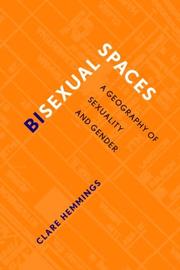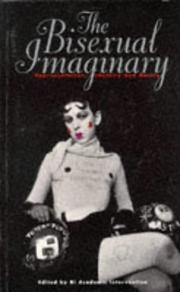| Listing 1 - 10 of 10 |
Sort by
|

ISBN: 0415930839 131779513X 1315811308 1317795148 9781317795131 9781317795148 9781315811307 0415930820 9780415930826 9780415930833 9781317795124 Year: 2002 Publisher: New York Routledge
Abstract | Keywords | Export | Availability | Bookmark
 Loading...
Loading...Choose an application
- Reference Manager
- EndNote
- RefWorks (Direct export to RefWorks)
First published in 2002. Routledge is an imprint of Taylor & Francis, an informa company.
Bisexuality --- Bi-sexuality --- Sexual orientation --- Homosexuality --- Philosophy. --- Developmental psychology --- Sociology of the family. Sociology of sexuality --- Sexology --- Bisexuals. --- Feminism --- Gender --- Sexuality --- Theory --- Book --- Bisexual people.
Book
Year: 2011 Publisher: Durham Duke University Press
Abstract | Keywords | Export | Availability | Bookmark
 Loading...
Loading...Choose an application
- Reference Manager
- EndNote
- RefWorks (Direct export to RefWorks)
Sociology of the family. Sociology of sexuality --- Social policy --- Feminism --- Feminist criticism --- Equal opportunities --- Gender --- Theory --- Women's studies --- Book
Book
ISBN: 9780822372257 9780822369981 9780822370031 Year: 2018 Publisher: Durham Duke University Press
Abstract | Keywords | Export | Availability | Bookmark
 Loading...
Loading...Choose an application
- Reference Manager
- EndNote
- RefWorks (Direct export to RefWorks)
Political philosophy. Social philosophy --- Sociology of the family. Sociology of sexuality --- Feminism --- Gender --- Anarchism --- Racism --- Sexuality --- Theory --- Goldman, Emma
Book
ISBN: 0822372258 Year: 2018 Publisher: Durham : Duke University Press,
Abstract | Keywords | Export | Availability | Bookmark
 Loading...
Loading...Choose an application
- Reference Manager
- EndNote
- RefWorks (Direct export to RefWorks)
In Considering Emma Goldman Clare Hemmings examines the significance of the anarchist activist and thinker for contemporary feminist politics. Rather than attempting to resolve the tensions and problems that Goldman's thinking about race, gender, and sexuality pose for feminist thought, Hemmings embraces them, finding them to be helpful in formulating a new queer feminist praxis. Mining three overlapping archives—Goldman's own writings, her historical and theoretical legacy, and an imaginative archive that responds creatively to gaps in those archives —Hemmings shows how serious engagement with Goldman's political ambivalences opens up larger questions surrounding feminist historiography, affect, fantasy, and knowledge production. Moreover, she explores her personal affinity for Goldman to illuminate the role that affective investment plays in shaping feminist storytelling. By considering Goldman in all her contradictions and complexity, Hemmings presents a queer feminist response to the ambivalences that also saturate contemporary queer feminist race theories.
Women anarchists --- Feminist theory. --- Anarchism. --- Women's rights. --- Goldman, Emma,
Digital
ISBN: 9780822393702 Year: 2011 Publisher: Durham Duke University Press
Abstract | Keywords | Export | Availability | Bookmark
 Loading...
Loading...Choose an application
- Reference Manager
- EndNote
- RefWorks (Direct export to RefWorks)
Why Stories Matter is a powerful critique of the stories that feminists tell about the past four decades of Western feminist theory. Clare Hemmings examines the narratives that make up feminist accounts of recent feminist history, highlights the ethical and political dilemmas raised by these narratives, and offers innovative strategies for transforming them. Drawing on her in-depth analysis of feminist journals, such as Signs, Feminist Review, and Feminist Theory, Hemmings argues that feminists portray the development of Western feminism through narratives of progress, loss, and return. Whether celebrating the move beyond unity or identity, lamenting the demise of a feminist political agenda, or proposing a return to a feminist vision from the past, by advancing these narratives feminists construct a mobile “political grammar” too easily adapted for postfeminist agendas. Hemmings insists that it is not enough for feminist theorists to lament what is most often perceived as the co-optation of feminism in global arenas. They must pay attention to the amenability of their own stories, narrative constructs, and grammatical forms to broader discursive uses of gender and feminism if history is not simply to repeat itself. Since citation practices and the mobilization of affect are central to how the narratives of progress, loss, and return persuade readers to suspend disbelief, they are also potential keys to telling the story of feminism’s past, present, and future differently.
Book
ISBN: 9780955358616 Year: 2006 Publisher: York Raw Nerve
Abstract | Keywords | Export | Availability | Bookmark
 Loading...
Loading...Choose an application
- Reference Manager
- EndNote
- RefWorks (Direct export to RefWorks)

ISBN: 0304337455 9780304337453 0304337447 Year: 1997 Publisher: London Cassell
Abstract | Keywords | Export | Availability | Bookmark
 Loading...
Loading...Choose an application
- Reference Manager
- EndNote
- RefWorks (Direct export to RefWorks)
"This collection of essays focuses on historical and contemporary representations of bisexuality - both "real" and "imagined" - in literature, film and the visual arts. They ask questions concerning what it means to desire both men and women and explores the role of bisexuality in the construction of every person's sexual identity." --
Fiction --- Developmental psychology --- Film --- Sexology --- Art --- Depth psychology --- Shakespeare, William --- Höch, Hannah --- Cahun, Claude --- Bisexuality. --- Bisexuality in literature. --- Bisexuals. --- Movies --- Identity --- Artists --- Literature --- Psychoanalysis --- Sexuality --- Bisexuality --- Book --- Bisexual people.
Book

ISBN: 9781446252413 1446252418 Year: 2014 Publisher: Los Angeles, Calif. Sage
Abstract | Keywords | Export | Availability | Bookmark
 Loading...
Loading...Choose an application
- Reference Manager
- EndNote
- RefWorks (Direct export to RefWorks)
"At no point in recorded history has there been an absence of intense, and heated, discussion about the subject of how to conduct relations between women and men. This Handbook provides a comprehensive guide to these omnipresent issues and debates, mapping the present and future of thinking about feminist theory. The chapters gathered here present the state of the art in scholarship in the field, covering: epistemology and marginality; literary, visual and cultural representations; sexuality; macro and microeconomics of gender; conflict and peace. The most important consensus in this volume is that a central organizing tenet of feminism is its willingness to examine the ways in which gender and relations between women and men have been (and are) organized. The authors bring a shared commitment to the critical appraisal of gender relations, as well as a recognition that to think 'theoretically' is not to detach concerns from lived experience but to extend the possibilities of understanding. With this focus on theory and theorizing about the world in which we live, this Handbook asks us, across all disciplines and situations, to abandon our taken-for-granted assumptions about the world and interrogate both the origin and the implications of our ideas about gender relations and feminism."--Publisher description.
Sociology of the family. Sociology of sexuality --- Feminist theory. --- Feminism --- Violence --- Army --- Literature --- War --- Popular culture --- Sexuality --- Theory --- Images of women --- Women's magazines --- Book --- Economy --- Epistemology
Book

ISBN: 1473907330 1785394169 1473909503 1473907349 Year: 2014 Publisher: London : SAGE Reference,
Abstract | Keywords | Export | Availability | Bookmark
 Loading...
Loading...Choose an application
- Reference Manager
- EndNote
- RefWorks (Direct export to RefWorks)
At no point in history has there been an absence of intense, and heated, discussion about the subject of how to conduct relations between women and men. This is a comprehensive guide to these omnipresent issues and debates, mapping the present and future of thinking about feminist theory.
Book

ISBN: 3110365480 3110391325 3110369516 9783110365481 9783110391329 9783110369519 Year: 2015 Publisher: Berlin Boston
Abstract | Keywords | Export | Availability | Bookmark
 Loading...
Loading...Choose an application
- Reference Manager
- EndNote
- RefWorks (Direct export to RefWorks)
Raymond Williams coined the notion "structure of feeling" in the 1970's to facilitate a historical understanding of "affective elements of consciousness and relationships." Since then, the need to understand emotions, moods and atmospheres as historical and social phenomena has only become more acute in an era of social networking, ubiquitous media and a public sphere permeated by commodities and advertisement culture. Concomitantly, affect studies have become one of the most thriving branches of contemporary humanities and social sciences. This volume explores the significance of the study of affectivity for already thriving fields of cultural analysis such as media studies, memory studies, gender studies and cultural studies at large. The volume is divided into four sections. The first part, Producing Affect, brings together contributions which explore some of the ways in which new media works to produce and intensify affectivity. The essays making up the second part, Affective Pasts, explore the significance of affect to the ways we remember, commemorate and in other ways get hold of things in our recent and not so recent past - or fail to do so. The essays engage the affective production of presence in contexts such as 9/11, the emotional culture of the eighteenth century, and literary auto-fiction. The third part, Affective Thinking, examines various concepts, theories, and forms of thinking not so much to show how the thinking in question may inform the field of affect studies but rather in order to draw attention to the way in which these modes of thinking are themselves already attuned to matters of affect. New social relations and ways of being in a networked world are the common themes of the essays in the final part of the volume, Circulating Affect.
Culture --- Affect (Psychology) --- Emotions --- Study and teaching. --- Sociological aspects. --- Sociology of emotions --- Cultural studies --- Sociology --- Psychology --- Affect. --- Cultural Studies. --- aesthetics. --- media.
| Listing 1 - 10 of 10 |
Sort by
|

 Search
Search Feedback
Feedback About UniCat
About UniCat  Help
Help News
News